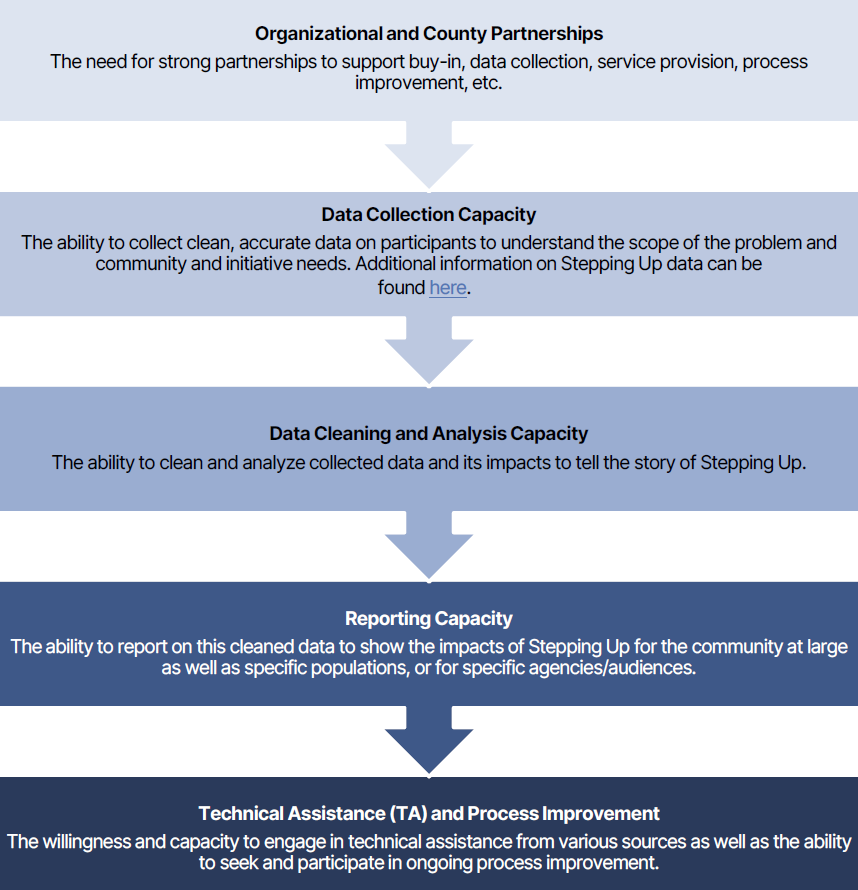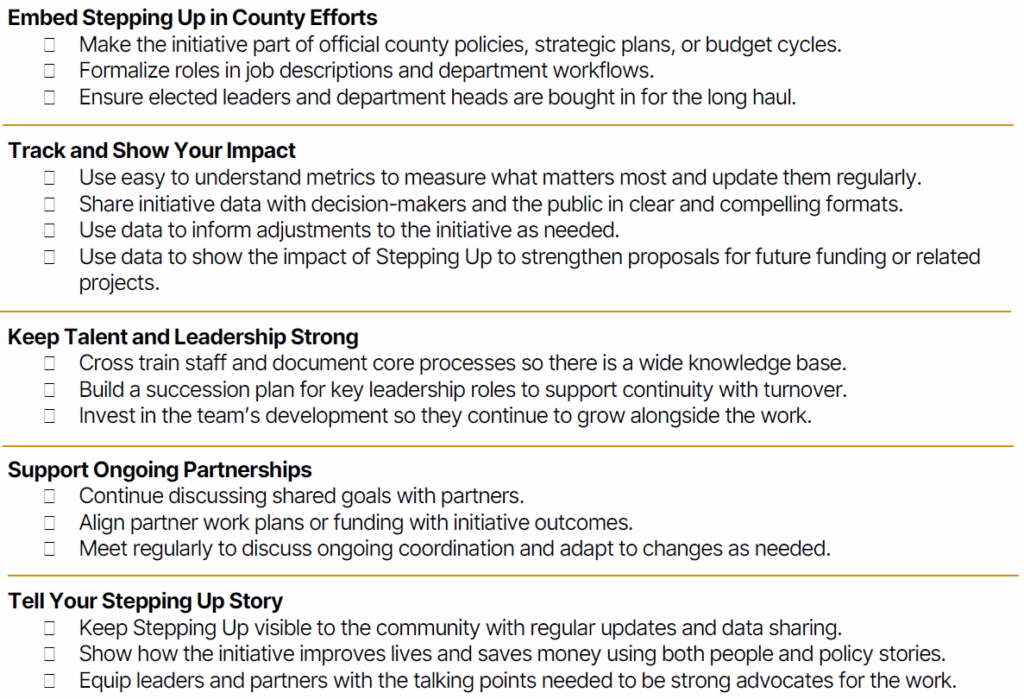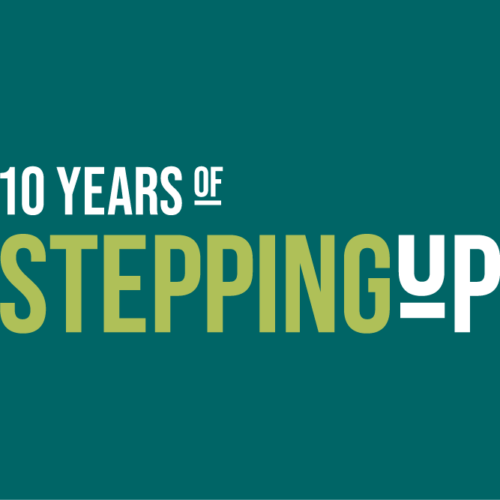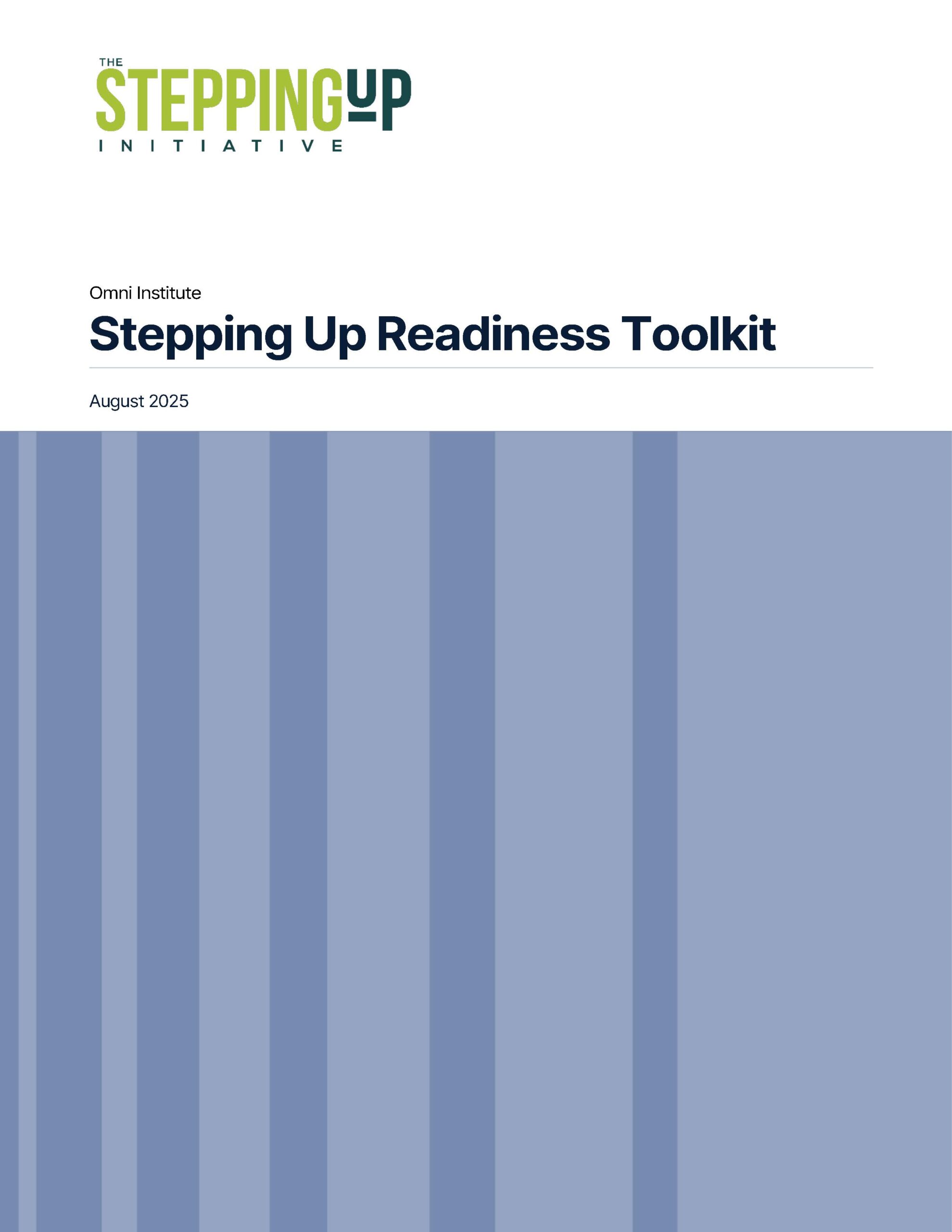Stepping Up Readiness Toolkit
Before beginning any new initiative, it is essential to assess readiness for implementation. Understanding various elements of readiness ensures counties can most effectively set a strong foundation for success. This toolkit is for counties interested in implementing Stepping Up, including counties new to Stepping Up, counties seeking to re-engage, or those currently implementing and looking to increase or sustain their capacity. It is designed for use in conjunction with the existing planning and implementation framework and can be used to assess readiness for both the adult and youth Stepping Up models.
Stepping Up Readiness Toolkit
Table of Contents
Click on a section to jump to it.
Stepping Up
Entry Level Capacity
Building Capacity
High Capacity
Sustainability Planning
Stepping Up Initiative Overview
The Stepping Up initiative was launched in 2015 as a partnership between The Council of State Governments (CSG) Justice Center, the National Association of Counties, and the American Psychiatric Association Foundation. Since then, Stepping Up has provided counties with tools to effect comprehensive, cross-systems change that can address the prevalence of mental illness and co-occurring substance use disorders in local justice systems. The Stepping Up initiative seeks to bolster cross-systems collaboration and build out community-based services and supports to reduce incarceration and reincarceration, respond effectively to people in crisis, and ultimately prevent contact with the justice system in the first place. The Stepping Up framework is designed to meet counties where they are, giving them the flexibility to select the best strategies for their local context. Because of this flexibility, counties may have questions about where they are in the process and if they are ready to begin implementing Stepping Up. This toolkit is for counties interested in implementing Stepping Up, including counties new to Stepping Up, counties seeking to re-engage, or those currently implementing and looking to increase or sustain their capacity. The toolkit is designed for use in conjunction with the existing planning and implementation framework and can be used to assess readiness for both the adult and youth Stepping Up models.
County Readiness Model
Before beginning any new initiative, it is essential to assess readiness for implementation. Understanding various elements of readiness ensures counties can most effectively set a strong foundation for success. Several factors associated with county readiness are described in the table below. Counties should consider their readiness as pre-work to revisit, grow or implement any new initiative including Stepping Up.
| Knowledge of the Issue | For Stepping Up, the issue at hand is the overrepresentation of individuals with serious behavioral health needs. Community members must first understand and acknowledge that this is an issue affecting their community. |
| Climate | Climate refers to the county’s attitude toward addressing the issue. Initiatives have stronger support from the community when the need can be demonstrated and buy-in is obtained by aligning with local priorities and attitudes. |
| Knowledge of Efforts | Community and partner knowledge of current initiatives and efforts is important to ensure that resources and support are known and accessible to all segments of the community. |
| Leadership | In addition to broader community buy-in, leadership and influential partners must also recognize the importance of the issue and support efforts to address it. Bringing important partners on board early minimizes challenges and facilitates implementation. |
| Resources | Resources include the funds, staff support, and external partnerships that are or could be used to address the issue. Ensuring that initiatives and their staff have the necessary resources, including financial and human resources, supports strong implementation and sustainability. |
Stepping Up Domains
In partnership with Omni, the CSG Justice Center has identified five key domains to assess readiness to implement, grow and sustain Stepping Up. These domains are interrelated and build on one another; counties should start by building their organizational and county partnerships and move down the list to ensure a successful foundation. The focus of each domain is described in additional detail below.

Capacity Levels
To assess capacity in each of these areas, counties should consider their current bandwidth and knowledge base to best assess where they fit on the continuum. To assess their current capacity, counties should review the following table and identify where they fit best in each of the categories. Counties may fall into several capacity ranges across categories, but it is strongly recommended that they select the lowest relevant capacity level to ensure a strong foundation across their Stepping Up efforts.
While there is no one-size-fits-all approach, the CSG Justice Center recommends being at “Building Capacity” in at least the Organizational and Community Partnerships and Data Collection Capacity domains before counties begin implementing Stepping Up.
| Entry Level Capacity | Building Capacity | High Capacity | |
|---|---|---|---|
| Organizational and County Partnerships |
|
|
|
| Data Collection Capacity |
|
|
|
| Data Cleaning and Analysis Capacity |
|
|
|
| Reporting Capacity |
|
|
|
| TA and Process Improvement |
|
|
|
Entry Level Capacity
Counties who identify as entry level capacity may be early in the process of establishing their readiness to implement Stepping Up for the first time, or those who previously implemented Stepping Up and are re-engaging in the initiative. Additional information on getting started can be found in the Stepping Up Coordinator Handbook.
Organizational and County Partnerships
A strong foundation of this work begins with effective partnerships with community agencies, including local jail staff, mental health providers, and more. Entry level counties may have no or minimal partnerships in this area with their community agencies. Developing these relationships could begin with sharing Stepping Up materials, scheduling introductory meetings, or sharing preliminary data to facilitate understanding and engagement with Stepping Up and the county’s work more broadly.
Data Collection Capacity
Data collection will ensure that the prevalence of individuals with behavioral health needs in jail is being tracked over time. Entry level counties may not have a standardized tool or process for collecting data, they may just be starting to collect data, but the process is inconsistent, and/or they may have low buy-in for data importance or staff capacity to collect data. To ensure robust data collection processes, the organization and its community partners must first understand the value of data collection for supporting their goals; and staff must then be provided with training and tools to collect the data reliably.
Data Cleaning and Analysis Capacity
Counties can build capacity by strengthening their ability to clean and analyze data in ways that support meaningful use of the findings. Counties may be entry level if they do not have the necessary tools or staff to clean and analyze data and/or if they are not currently engaging in cleaning and analysis tasks. Ways to support completion of data tasks include designating a trained staff member responsible for these activities and by creating clear documentation of processes to ensure they are replicable on a regular cadence. While data analysis may sound complicated, when starting out it can be as simple as documenting counts, percentages, demographic groups, etc., using tools such as Excel or Google Sheets.
Reporting Capacity
Reporting data in a clear and timely manner is important to share progress and drive decision-making. Counties at entry-level capacity may be uncertain about their reporting needs and goals and/or they may not currently have a process for reporting back to community agencies and partners. To support strong reporting, the county and its partners must first recognize the value of reporting their data and have a vision for how these reports will be shared and used. Once there is buy-in, staff can be trained to support reporting. As with data analysis, data reporting can be simple and use methods such as dashboards in Excel, or narrative summaries created in Word.
TA and Process Improvement
Technical assistance (TA) and process improvement are important aspects of ensuring strong implementation. TA supports may include sharing resources and templates, providing tailored training to staff, and or being available to troubleshoot emerging issues. Counties in the entry level stage may not see the need for technical assistance or process improvement or may not have the necessary staff capacity to engage in these processes. While counties in the entry level capacity stage may not be focused on technical assistance and process improvement, many of the services and supports that technical assistance agencies (such as The CSG Justice Center) offer are highly beneficial to getting an initiative off the ground and sustaining it. Understanding what technical assistance is available allows counties to engage where they can strengthen their skills and supports.
Building Capacity

Photo Credit: fauxels/Pexels
Counties who identify as building capacity may be early in the process of establishing their readiness to implement Stepping Up with more foundational support than the entry level capacity or may already be implementing Stepping Up and need to reset due to turnover or process changes.
Organizational and County Partnerships
When counties move into the building capacity phase, they are starting to establish a foundation for organizational and community partnerships. This may include some active partnerships internally and/or externally with community partners, such as correctional facilities or service providers. While these collaborative efforts may be in early stages, they exist and are working towards a place where partners are engaged with the process and the results of Stepping Up.
Data Collection Capacity
Once counties have been able to establish partnerships, they will likely have an easier time collecting data from these organizations. Working towards a common cause creates shared investment and accountability. Counties at building capacity for data collection have basic data collection tools in place and data are collected consistently. A universal mental health screening tool, such as the Brief Jail Mental Health screen (BJMHS) is administered to all individuals being booked into jail for a baseline understanding of the presence of the target population within the jail. Staff may have the capacity and skills to support data collection in a meaningful way in the regular course of their duties.
Data Cleaning and Analysis Capacity
Once counties can consistently collect data using standardized data collection tools, they are positioned to begin cleaning and analyzing this data by developing processes to document their cleaning and analysis steps. Basic counts and percentages can be calculated using tools like Excel. Counties can begin with a focus on analysis of their overall population, and from there, may be able to conduct some subgroup analyses (ex. examining results by demographic categories such as age or sex). Counties may be building capacity if staff understand how to use basic tools to perform regular analysis on their data and are working towards ensuring training or resources are in place to support ongoing analysis.
Reporting Capacity
Counties that can consistently analyze their data will have data to report on regularly. At building capacity, counties can continue to develop a clear understanding of what type of reporting is most useful for their goals and what reporting cadence is feasible for their leadership and their community partners. Reporting can be standardized with templates or common guidance to frame what data is included, how often it is shared, and with whom. Additionally, counties can share these reports with partners and set the stage for conversations about data and informing decisions.
TA and Process Improvement
Engaging in technical assistance and process improvement at the building capacity stage may look similar to entry level counties, where establishing and documenting processes and training is key. Counties may now have the time and capacity to work towards establishing these supports in their work. Counties can begin to prioritize process improvement by reflecting on other initiatives happening in their community. By understanding other relevant gaps, efforts, and priorities, counties can more effectively align Stepping Up with their other efforts to broaden their impact.
High Capacity
Counties who are high capacity may be implementing Stepping Up for the first time after building a strong foundation, counties that have already been implementing Stepping Up, or counties who already are, or are looking to become Stepping Up Innovator Counties*.
Organizational and County Partnerships
Counties in the high capacity phase have strong, long-standing trust-based partnerships with their internal leadership, as well as community partners. This may include regular communication, data sharing, and shared decision-making that considers the various factors impacting their shared community work. While there may still be room for growth in these relationships, or additional connections a county would like to establish, counties are supported by community partners and have shared goals that are being addressed by their efforts. At high capacity, counties may also collaborate with other counties in the state to share learnings and understand other local implementation efforts.
Data Collection Capacity
In addition to these partnerships, high capacity counties have robust data systems and protocols in place to support ongoing data collection. These counties are using validated screening tools that are appropriate for the population and the work they are doing, and that are consistently administered. Staff have knowledge of these systems and tools and have a process for integrating them into their work. Agencies have detailed training materials on how data processes are utilized so there is documentation for refresher trainings or in case of turnover. Additionally, several staff are trained in data collection to ensure there are no gaps in capacity.
Data Cleaning and Analysis Capacity
At high capacity, counties have detailed protocols built into their work. Counties also have strong staffing, such as one or more dedicated data analysts who are responsible for handling all analytical tasks. At this stage, counties also have clear data documentation such as data cleaning scripts and data dictionaries to outline their processes. Counties may also use more advanced tools to analyze their data. While tools like Excel and Google Sheets are sufficient and can be used as needed, there are more advanced statistical software options, such as SAS, SPSS, R or Stata which can make complex analysis easier and more replicable. High capacity counties may also use tools like Power BI or Tableau to create dashboards for presenting data.
Reporting Capacity
In addition to increased capacity in data analysis, high capacity counties have strong reporting procedures. High capacity counties regularly provide reports to both internal leadership and community partners. These reports are standardized and available on a regular cadence or for ad-hoc requests. In addition to these reports being available, they are also used to inform decision-making. Regularly sharing and reviewing reports supports counties in tracking their progress, identifying areas for change and focusing initiative and community resources where they will be most impactful. Decision making based on shared data helps build rapport and trust with partners and strengthens the impact of the initiative.
TA and Process Improvement
While high capacity counties may not need as much ongoing technical assistance, these counties can still utilize any available resources that may support their work. High capacity counties may also be well positioned to support counties at the entry level and building capacity stages as a TA provider, this may include collaborating with other counties implementing Stepping Up to share data and discuss processes, or engaging with counties who are not yet implementing the initiative. At high capacity, counties can spend additional time engaging in continuous quality improvement by having integrated processes like surveys or regular data auditing to self-assess any potential areas for improvement. Counties can reflect on how they can best work with their community partners and other initiatives in their community to address priority areas. This integration of efforts will ensure the best wraparound services to improve overall community well-being.
*Innovator Counties are those who demonstrate they have a process for obtaining and tracking accurate, accessible data on serious mental illness in their jails to leverage this baseline data for tracking their Stepping Up goals. Read more information on innovators, including how to become one.
Sustainability Planning
Once a county reaches high capacity, they should turn their attention to focusing on sustainability planning. Sustainability planning is essential to ensure that county initiatives are not only impactful in the short term but remain successful over time. By investing time in continuing to sustain the relationships, policies and resources developed over the implementation of the program, initiatives can support lasting change that supports continuity in times of uncertainty including funding gaps, staffing turnover and shifting priorities. To support strong sustainability of Stepping Up, counties can use the following checklist to identify potential priorities or areas to address in their community.

Download the Checklist
If you have questions about the information in this toolkit, please contact steppingup@csg.org.
Project Credits
Writing: Omni Institute
Research: Omni Institute
Advising: Audra Goldsmith and Megan Davidson, CSG Justice Center
Editing: Alice Oh and Darby Baham, CSG Justice Center
Design: Omni Institute
Web Development: Caroline Cournoyer, CSG Justice Center
Public Affairs: Sarah Kelley, CSG Justice Center
As the Stepping Up initiative marks its 10th year, America’s justice and behavioral health systems are facing a…
Read More19 states were recently granted permission by CMS to reimburse critical reentry services with Medicaid funding for up…
Read More"It is the humane, person-centered approach that supports and stabilizes individuals, their families, and their communities."
Read More The 10-Year Impact—and Future—of Stepping Up: Facing the Behavioral Health Crisis in Jails and Communities with Real Solutions
The 10-Year Impact—and Future—of Stepping Up: Facing the Behavioral Health Crisis in Jails and Communities with Real Solutions
As the Stepping Up initiative marks its 10th year, America’s justice and…
Read More A “Once in a Generation Opportunity” to Improve Reentry for Nearly 2 Million People
A “Once in a Generation Opportunity” to Improve Reentry for Nearly 2 Million People
19 states were recently granted permission by CMS to reimburse critical reentry…
Read More Local Criminal Justice System Innovations in Mental Health Services: Q&A with CSG Justice Center Advisory Board Member Dr. Doreen Williams
Local Criminal Justice System Innovations in Mental Health Services: Q&A with CSG Justice Center Advisory Board Member Dr. Doreen Williams
"It is the humane, person-centered approach that supports and stabilizes individuals, their…
Read More











